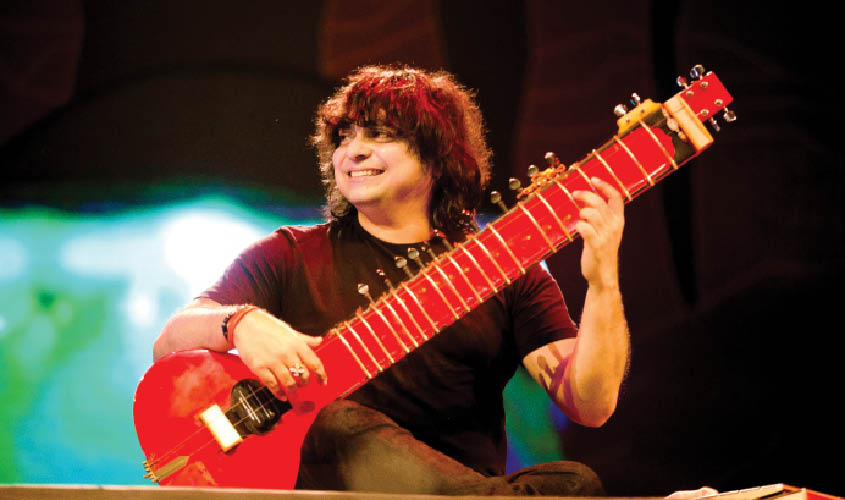Fusion music exponent Niladri Kumar gave his first public performance at the age of six, and now, around two decades into his career, he has become one of the most sough-after musicians in India. He is a fifth-generation sitar player in his family, trained both under his father, the famous sitarist and classical musician Pandit Kartick Kumar, and the legendary Pandit Ravi Shankar.
Kumar takes pride in his family’s musical legacy. “I was lucky to have been born to Pandit Kartick Kumar, for it was he who not just worked towards it [his early start] but even thought about me when I was young, and moulded me to learn and perform at a young age. I was extremely lucky and it still remains a blessing,” he says.
In his career, he has produced more than 15 albums, all stylistically different from each other. Kumar believes that it is extremely important for a musician to reinvent his style to meet the expectations of the present era. “It [reinventing] is the most important ingredient in the mix. It is also difficult to explain this here. The emphasis is not on the changing times. Rather, the emphasis is on being able to communicate in this era, to this generation and to remain relevant to the times. At the same time, you have to uphold certain core values and traditions, however difficult it is, for that is what our music stands for,” he says.
Kumar also swears by a very important lesson that he has learned rom his father when it comes to making music. He says, “The three things that you need to have, irrespective of any era or generation, are knowledge, honesty and discipline.”
His musical apprenticeship under his father wasn’t as smooth as we would like to believe. Kumar shares, “My father was strict and quite a disciplinarian when it came to music. But he was the same to all his students, including me. In fact, at times he would make me sit to play with his senior students and that was part of the training system.”
Kumar doesn’t believe in categorising his music, and says that it is for the listeners to compartmentalise if required. As for him, he maintains that he has only learned Indian classical music.
So what about the Western influence that we find in his compositions?
He answers, “I don’t play Western music for I have not learned jazz or Western classical or any of those forms. What sounds Westernised to the common ear is not Western music but the hint of the lifestyle that is attached to that music which is called Western. I learned music from my father in the guru-shishya way of learning at home. But my exposure to music outside of the home was almost everything but classical music. I had my friends listening to pop, rock and film music, and it probably was the seed that was sown in me to do something, and to be able to communicate to my own generation the music that I learned, and that is Indian traditional classical music. One thing leads to the other. Some day, if and when I write a book, I will elaborate on this journey and its results.”
Credited with the creation of the “zitar” (an electric sitar with five strings), Kumar says he is still trying to achieve the right balance between performing pure classical and fusion music.
Though there haven’t been many instances when a sitar player has composed a music album for a mainstream Hindi film, Kumar’s recent collaboration with Sajid Ali and Imtiaz Ali for their latest film, Laila Majnu, has received an overwhelming response.
On his experience of composing music for the film, he says, “For me, music should be such that it evokes a sentiment and touches the listener in a way that it allows them to paint their own visual picture in their mind. This film is retelling one of the greatest love stories known. That visual itself is a muse enough for me to have wanted to do this film. As an instrumentalist playing the sitar, I’ve never had the good fortune to use poetry and words to convey the sentiments I would like to convey through melodies. When you have the magic in the form of voices like Arijit [Singh], Atif [Aslam], Shreya [Ghoshal], Babul [Supriyo], Javed [Ali] and Jonita [Gandhi]—they bring the melody alive in a way that otherwise would not be possible. The music provides context to the lead pair, by documenting a blossoming romance between the two, before it launches into a disturbing climax.”
Kumar has also composed songs for movies like Shorgul (2016) and Niruttara (Kannada film, 2016) in the past. Was the experience any different this time?
“Every project is different. Even composing music for a sequel is different, although you might have to maintain a certain theme in a certain way. So my experience with composing for Laila Majnu was not only different but quite enriching, too,” he replies.
As for the creative freedom he got while working on the project, he says, “There was freedom within a certain discipline or the certain requirements of film music. You have to know the ways of moulding melodies at times, to convey different sentiments. There are needs which have to be sufficed. But at the same time working closely with the director Sajid Ali, who is the younger brother of Imtiaz Ali, was a great experience. Sajid Ali does have a keen ear for music and hence it made things flow in the right direction.”
Kumar doesn’t divulge any details on his future projects and concludes by saying, “A few as always in the pipeline. Hope and pray they see the light of the day.”

